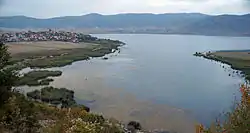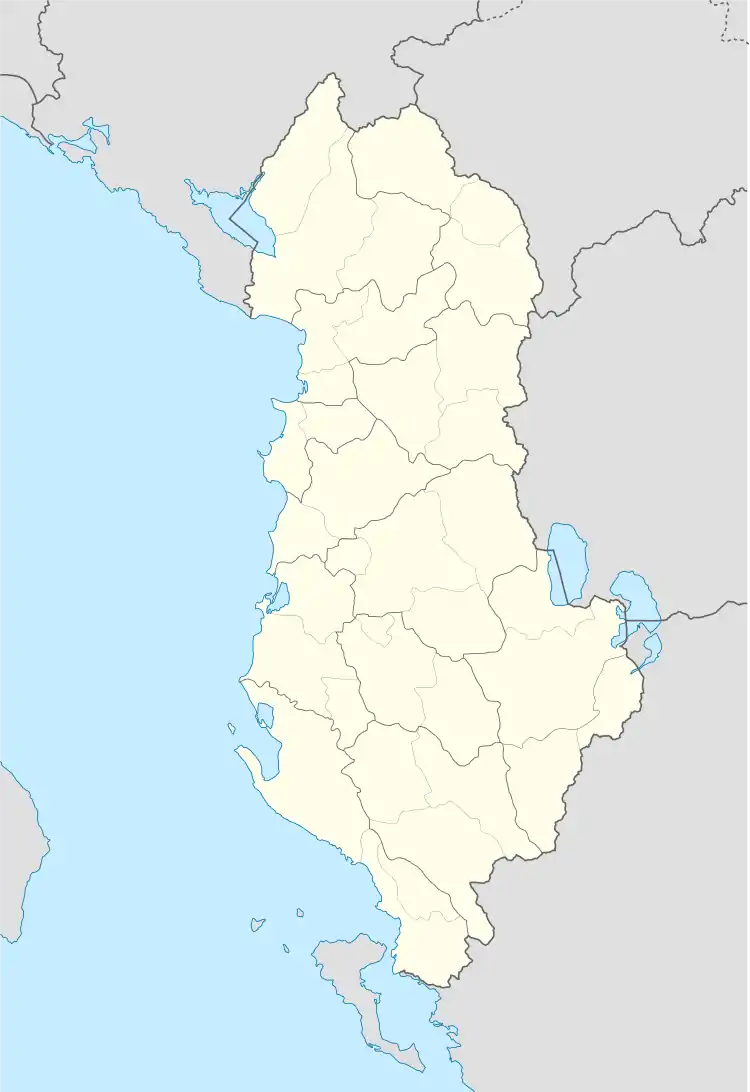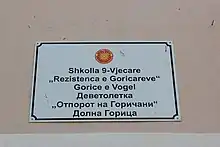Dolna Gorica
Dolna Gorica (Albanian: Dollna Goricë, Macedonian and Bulgarian:[1][2][3] Долна Горица), formerly Goricë e Vogël, is a village on the western shore of Lake Prespa in the Pustec Municipality which is officially recognised as a Macedonian minority zone[4] located in the Korçë County in Albania.[5] According to Bulgarian sources, including research by a Bulgarian scientist from Albania, the local inhabitants are Bulgarians.[6][7]
Dolna Gorica
Dollna Goricë Goricë e Vogël Долна Горица | |
|---|---|
 Dolna Gorica and Lake Prespa | |
 Dolna Gorica | |
| Coordinates: 40°52′37.92″N 20°55′30″E | |
| Country | |
| County | Korçë |
| Municipality | Pustec |
| Municipal unit | Pustec |
| Population (2007) | |
| • Total | 550 |
| Time zone | UTC+1 (CET) |
| • Summer (DST) | UTC+2 (CEST) |
History
A survey in the late 19th century found Dolna Gorica to consist of 75 houses and 67 male Bulgarian Orthodox residents.[8] In 1900, Vasil Kanchov gathered and compiled statistics on demographics in the area and reported that the village of Dolna Goritsa was inhabited by about 42 Bulgarian Christians.[9]
In February 1996, the village hosted a conference attended by officials from the Republic of Macedonia on the subject of the ethnic Macedonian minority in Albania.[10] In 2013, the village's official name was changed from "Goricë e Vogël" to "Dolna Gorica".[11]
Demographics
A 2007 estimate put the village's population at 550.[12]
| Year | Population |
|---|---|
| 1900 | 42 |
| 1926 | 511 (with Gorna Gorica) |
| 1945 | 149 |
| 1960 | 108 |
| 1969 | 210 |
| 1979 | 271 |
| 1989 | 253 |
| 2000 | 364[13] |

Culture
In 2002, a library opened in the village consisting of primarily Macedonian-language books.[14]
A monument commemorating the ethnic Macedonian refugees of the Greek Civil War was unveiled in the village in May, 2013.[15]
Dolna Gorica is home to the annual "Day of Wine" event, occurring each December.[16]
References
- German Academic Exchange Service: Humboldt Balkan Cosmos - Dolna Gorica.
- General survey of the nominal system of the Bulgarians in Mala Prespa — Albania. (Bg.) p. 170; in State and Problems of Bulgarian Onomastics, 2010 / Vol 11 / Issue 1, pp. 169-176.
- Albania officially recognizes Bulgarian minority. Xinhua| 2017-10-13.
- https://minorityrights.org/minorities/macedonians/
- "Law nr. 115/2014" (PDF). Archived from the original (PDF) on 2015-09-24. Retrieved 2015-06-29.
- Бело Раки (Belo, Raki). Селищни имена в Мала Преспа - Албания, в: Македонски преглед, ХХХ, № 3, с. 134.
- Пашова, Анастасия. Българите в района на Корча и Мала Преспа (Албания) - съвременна картина, Балканистичен Форум, 2005, №1-3, с. 113-129 (Pashova, Anastasija. Bulgarians in the region of Korcha and Mala Prespa (Albania) nowadays, Balcanistic forum, 2005, issue No: 1-3, pp. 113-129.)
- Българите в Албания I част Archived 2009-07-09 at the Wayback Machine
- Васил Кънчов. „Македония. Етнография и статистика“. София, 1900, стр. 242. (Macedonia: Ethnography and Statistics, p. 242. Accessed 13 May 2018 (in Bulgarian)
- Vickers, Miranada; Pettifer, James (2000). Albania: From Anarchy to a Balkan Identity. New York, NY: New York University Press. p. 205. ISBN 9780814788059. Retrieved 11 May 2014.
- "Pas Pustecit, edhe 7 fshatra të Korçës me emertime maqedonase" (in Albanian). Info Arkiv. 17 April 2013. Archived from the original on 2014-08-05. Retrieved 29 July 2014.
- Бело Раки (Belo, Raki). Селищни имена в Мала Преспа - Албания, в: Македонски преглед, ХХХ, №3, стр. 135.
- "Archived copy" (PDF). Archived from the original (PDF) on 2012-02-11. Retrieved 2008-04-17.CS1 maint: archived copy as title (link)
- ""The Temple of the Book" – Window towards the Fatherland". Culture.in.mk. 4 March 2002. Archived from the original on 12 May 2014. Retrieved 11 May 2014.
- Janevska, Ubavka (7 May 2013). "Во село Горица поставен споменик за егзодусот на македонските бегалци". Kanal 5 (in Macedonian). Retrieved 12 May 2014.
- "Мала Преспа организира манифестација "Ден на виното"" (in Macedonian). Lider. 23 December 2013. Retrieved 12 May 2014.

